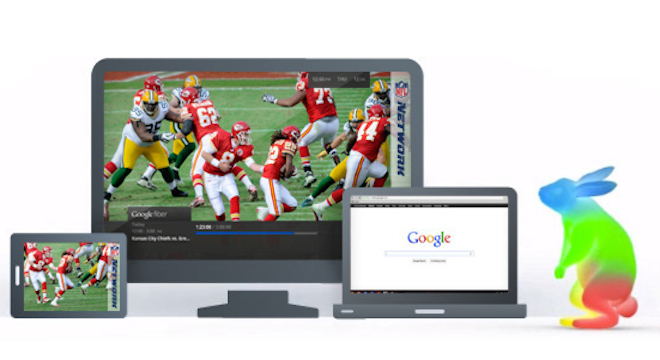As promised, Google on Thursday unveiled and began taking pre-orders for its newest product, some of the fastest Internet service in the country: A 1-gigabit-per-second connection known as Google Fiber.
To put that in comparison, the average broadband internet connection speed across the U.S. is a measly 5.8 megabits-per-second. (Perhaps being charitable, Google claims its Google Fiber service is “100 times faster than today’s average broadband.”)
Google Fiber is for now limited to Kansas City, Missouri, and Kansas City, Kansas, neighboring cities on the Kansas state and Missouri border that make up the Kansas City metropolitan area, a location chosen after a two-year-long contest to determine the best community for Google to kick-off its quest to compete with existing internet service providers, cable giants such as Time Warner and Comcast.
Check out the following video Google released Thursday to promote its new Google Fiber service. Google also released a video of its executives in Kansas City making the announcement.
But the government of Kansas City, Missouri, which will have several buildings hooked up to the service, says that broadly speaking, residents are taking a “wait and see” approach when it comes Google’s newest business ploy.
“I don’t think anybody knows one-hundred percent how it will play out it in the long run,” said Dennis Gagnon, communications director for the City of Kansas City, in a phone interview with TPM, regarding Google Fiber. Gagnon said he had run into “about a dozen” people who said they had pre-registered for Google Fiber and told him about it, unsolicited.
“I think everyone’s excited about the announcement, people see it as a positive,” Gagnon added. “We’re kind of keeping our fingers crossed.”
Gagnon pointed out that so far, Google had only committed to providing fiber service to the urban center of Kansas City, Missouri, as well as most of Kansas City, Kansas.
But areas in Kansas City, Missouri north of the Missouri River, which bisects the city, won’t get Google Fiber until some unspecified time in the future. Google will also delay installation of fiber in the center of Kansas City, Missouri, until 2013.
“We announced that Google Fiber would be coming to Kansas City, KS first, which gave us a head start on our work there,” Google wrote in its Google Fiber FAQ, “We’ll begin building Fiber to homes in Kansas City, KS first, but we plan to have service to fiberhoods in Kansas City, MO in early 2013.”
“The river creates infrastructure delivery issues,” Gagnon acknowledged. “Today we saw they’re [Google is] focusing on the logical high density areas.”
Specifically, Google is offering three different Google Fiber plans: A gigabit Internet connection plan only, which costs $70-per-month and provides customers with “a gigabit-enabled network box with advanced WiFi and 1TB of cloud storage on Google Drive.”
Customers can also spring for a more or less expensive package. The high-end package, $120-a-month, will provide internet access as well as a TV service with over 160 cable channels, though HBO, AMC, Fox News and Fox Sports, and Disney-owned channels, including ESPN, are missing for now. The Google Fiber TV package also includes the company’s new Nexus 7 tablet as its remote, and three set-top boxes: a TV box, a storage box and a network box. The lower-end package offers just 5-megabit internet access for a $300 installation fee and no monthly service charge thereafter, which Google says is akin to “free Internet.”
But Google won’t just provide the services to anyone who signs-up for them. Instead, the company explains on its order page that it has divided the city into areas it calls “fiberhoods,” and applied for each a “pre-registration goal,” of demand.
Google won’t actually hook up anyone until enough residents in each area of Kansas City pre-register, which they can do from now through September 9. In essence, Google is hoping that those who want the service will pressure their friends into signing up for it as well.
Still, the company is quite optimistic about its future as Internet service provider in Kansas City and beyond.
“No more buffering,” wrote Milo Medin, Google’s vice president of access services, in an official company blog post on Thursday. “No more loading. No more waiting. Gigabit speeds will get rid of these pesky, archaic problems and open up new opportunities for the web. Imagine: instantaneous sharing; truly global education; medical appointments with 3D imaging; even new industries that we haven’t even dreamed of, powered by a gig.
Gagnon, too, offered an optimistic look at the possibilities of Google Fiber middle America, comparing it to previous milestones in human history.
“When someone first put a covered wagon out into the prairies, who would’ve thought all this would spring up in the last hundred or two hundred years,” said Gagnon. “You can never quite anticipate what the ramifications of providing a new infrastructure service will be.”
That said, the Internet remains a primarily reciprocal piece of technology, which is why Chattanooga, Tennessee’s own experiment with a citywide fiber service, offered through public utility EPB, hasn’t changed much, as GigaOm reported on Wednesday.
Correction: This article originally incorrectly identified Google’s new tablet as the “Galaxy Nexus 7,” when in fact, the device is simply called the “Nexus 7.” We’ve updated the post to correct the error in copy and regret it.






